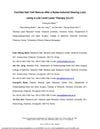 1 citations,
March 2021 in “Skin health and disease”
1 citations,
March 2021 in “Skin health and disease” Better hair loss models needed for research.
 1 citations,
February 2021 in “Cosmetics”
1 citations,
February 2021 in “Cosmetics” Fagraea berteroana fruit extract may promote hair growth by affecting cell proliferation and hair growth pathways.
 1 citations,
May 2017 in “InTech eBooks”
1 citations,
May 2017 in “InTech eBooks” Some natural remedies may help with hair regrowth, but more research is needed to confirm their effectiveness and safety.
 1 citations,
October 2015 in “CRC Press eBooks”
1 citations,
October 2015 in “CRC Press eBooks” Nutricosmetics with active ingredients can help with hair loss and improve hair growth.
 December 2024 in “Cureus”
December 2024 in “Cureus” Baricitinib treatment for alopecia universalis can cause hair regrowth with unexpected whitening.
 July 2024 in “Frontiers in Pharmacology”
July 2024 in “Frontiers in Pharmacology” Pilose antler extracts help hair growth by activating hair follicle stem cells.
 June 2024 in “Frontiers in pharmacology”
June 2024 in “Frontiers in pharmacology” 2-deoxy-D-ribose gel may help regrow hair in cases of hair loss.
 December 2023 in “International Journal of Science and Research (IJSR)”
December 2023 in “International Journal of Science and Research (IJSR)” Herbal treatments are effective and preferred for hair loss with fewer side effects.
 November 2023 in “International journal of biology, pharmacy and allied sciences”
November 2023 in “International journal of biology, pharmacy and allied sciences” Herbal treatments can help with hair problems, but more research is needed.
 June 2023 in “Sains Malaysiana”
June 2023 in “Sains Malaysiana” Cinchonine Nanostructured Lipid Carriers serum safely and effectively stimulates hair growth and increases the number and size of hair follicles.
 January 2020 in “Elsevier eBooks”
January 2020 in “Elsevier eBooks” Plant-based chemicals may help hair growth and prevent hair loss but need more research to compete with current treatments.
 April 2018 in “Journal of Investigative Dermatology”
April 2018 in “Journal of Investigative Dermatology” Aging reduces skin cell renewal and defense against germs due to TGFbeta, but blocking TGFbeta could help restore these functions.
 April 2018 in “Journal of Investigative Dermatology”
April 2018 in “Journal of Investigative Dermatology” Removing STAT5 from 3D-cultured human skin cells reduces their ability to grow hair.
 April 2018 in “Journal of Investigative Dermatology”
April 2018 in “Journal of Investigative Dermatology” Kaempferol helps skin stem cells grow and may improve skin thickness due to its 3-OH group.
Avicennia Marina extract and avicequinone C can reduce hair loss hormone production and increase hair growth factors, suggesting they could be used to treat androgenic alopecia.

Some plant-based ingredients may help with hair growth and care, but more research is needed to confirm their effectiveness.
 September 2013 in “Daehan hwajangpum hakoeji/Daehan hwa'jangpum haghoeji”
September 2013 in “Daehan hwajangpum hakoeji/Daehan hwa'jangpum haghoeji” Shampoo with ginseng helped improve hair thickness, density, growth, and reduced hair loss.
 January 2012 in “Journal of Natural Remedies”
January 2012 in “Journal of Natural Remedies” The Abrus precatorius extract can effectively promote hair growth similar to standard treatments.

Low Level Laser Therapy may improve noise-induced hearing loss.
 April 2018 in “Journal of Investigative Dermatology”
April 2018 in “Journal of Investigative Dermatology”  February 2023 in “Journal of Ginseng Research/Journal of ginseng research”
February 2023 in “Journal of Ginseng Research/Journal of ginseng research” New ginseng compounds may help treat degenerative diseases.
15 citations,
September 2012 in “PTR. Phytotherapy research/Phytotherapy research” Ginsenosides Rb₁ and Rd may help prevent hair loss by promoting hair cell growth.
 January 2024 in “Aesthetic Plastic Surgery”
January 2024 in “Aesthetic Plastic Surgery” Botox can help prevent hair loss by blocking cell death in scalp cells.
 32 citations,
January 2022 in “International Journal of Molecular Sciences”
32 citations,
January 2022 in “International Journal of Molecular Sciences” Melatonin, a hormone, can help protect skin from aging by reducing stress, inflammation, and damage, and may also help treat hair loss in women.
21 citations,
January 2020 in “Pharmaceutical Biology” Salvia plebeia extract can stimulate hair growth.
13 citations,
August 2018 in “Life sciences” Kang-ai injection with platinum-based chemotherapy improves tumor response and immune function while reducing side effects in advanced lung cancer.
9 citations,
June 2023 in “Cells” Certain natural and synthetic compounds may help treat inflammatory skin diseases by targeting a specific signaling pathway.
 9 citations,
December 2022 in “Phytomedicine”
9 citations,
December 2022 in “Phytomedicine” More high-quality research is needed to recommend flavonoids and saponins for clinical use.
 8 citations,
July 2022 in “International Journal of Molecular Sciences”
8 citations,
July 2022 in “International Journal of Molecular Sciences” Skin cells release substances important for healing and fighting infection, and understanding these could improve skin disorder treatments.
 8 citations,
June 2022 in “International Journal of Molecular Sciences”
8 citations,
June 2022 in “International Journal of Molecular Sciences” Tiny particles called extracellular vesicles show promise for skin improvement and anti-aging in facial care but face challenges like low production and lack of research.

























